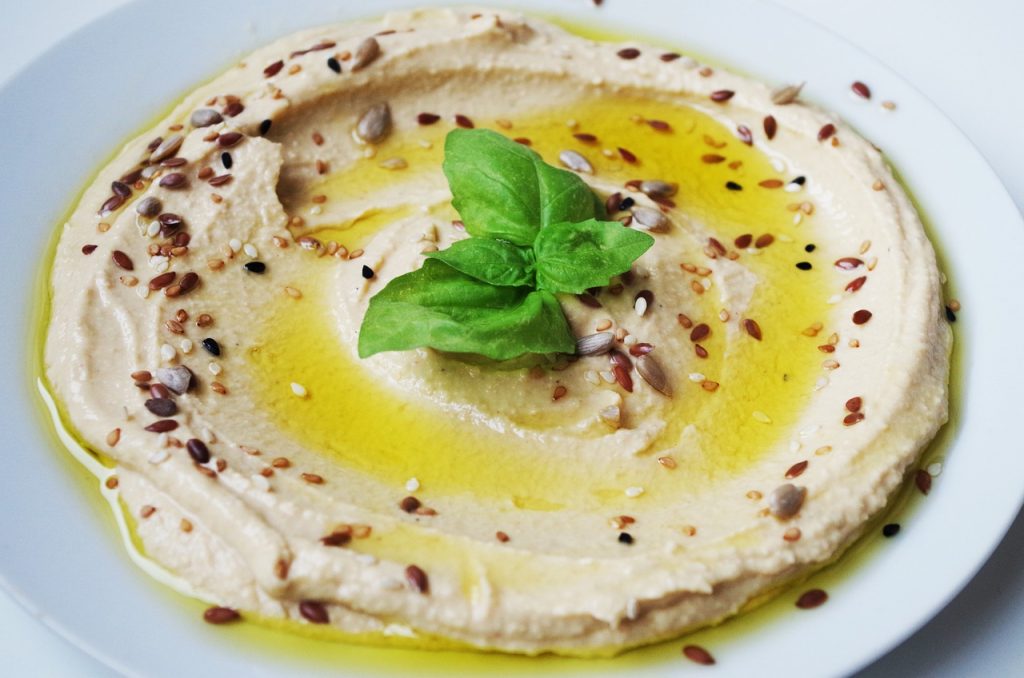Hummus is a popular snack and condiment made of mashed chickpeas, tahini, garlic, and other ingredients.
It’s a tasty snack for humans, but is it safe for our four-legged friends? We recently wrote ob; Can Dogs Eat Capsicum, 5 Top Facts About Bell Peppers, you can also, check it out!
In this blog post, we’ll explore the question of whether dogs can eat hummus and discuss the potential risks and benefits of serving it as a snack.
Contents
What is hummus?

Hummus is a Middle Eastern spread or dip made from cooked, mashed chickpeas blended with tahini, olive oil, lemon juice, salt, and garlic.
It is a popular snack and appetizer in many countries, including the United States, and is often served as a dip with pita bread or crackers.
Hummus is high in protein, fiber, and healthy fats, making it a nutritious and filling snack. It is also a great source of vitamins and minerals, including iron, folate, phosphorus, and zinc.
We recently wrote; Can Dogs Eat Ketchup? | Can A Dog Eat Ketchup? – 6 Top Unique Facts You Need To Know and this might also interest you to read.
Therefore, hummus can be a healthy treat for your pup, as long as you follow a few important guidelines.
First, it is important to check the ingredients list of the hummus you are feeding your pup to make sure it does not contain any ingredients that might be harmful to dogs.
This includes garlic, onions, and raisins, all of which can be toxic to dogs. You should also avoid any hummus that contains added sugar or artificial sweeteners, as these can also be dangerous for dogs.
Finally, it is important to remember that hummus should not be used as a replacement for a balanced diet for your pup.
It should only be given as an occasional treat, not as a meal replacement.
Overall, hummus can be a healthy and tasty snack for your pup, as long as you follow the guidelines above.
Hummus can be enjoyed on its own or used as a spread on sandwiches, wraps, and pitas.
You should always consult with your veterinarian before feeding your pup any new food, and be sure to watch your pup closely while they enjoy its snack.
Can Dogs Eat Hummus?
The question ” Can Dogs Eat Hummus? or do dogs eat hummus?” led to this section of the article.
Generally speaking, hummus is not toxic to dogs, but some of the ingredients can cause digestive upset if they are not used in moderation.
Chickpeas, in particular, can cause gas, bloating, and diarrhea if your dog overeats of them.
If you want to give your dog hummus, make sure to only provide a small amount, and avoid any flavors with added spices.
It is also important to watch for any signs of digestive distress after eating hummus, such as vomiting, diarrhea, or decreased appetite.
If you notice any of these signs, stop feeding it and consult with your veterinarian.
Overall, hummus can be a healthy snack for dogs in moderation. Just make sure to provide only a small amount, avoid any flavors with added spices, and be on the lookout for any signs of digestive distress.
With these precautions in mind, hummus can be a tasty treat for your pup!
Can Dogs Eat Red Pepper Hummus? | Do Dogs Eat Red Pepper Hummus?
The question ” Can Dogs Eat Hummus? or do dogs eat hummus?” led to this section of the article.
As for the question “Dogs can eat hummus?”. Dogs can eat hummus, but they should avoid the ingredients that make it spicy, like red peppers.
Red pepper hummus can be a flavorful snack for your pup, as long as it’s served in moderation.
Red pepper hummus should be served to dogs in very small amounts and as an occasional treat.
Dogs should not eat hummus regularly, as it can cause digestive issues and other health problems.
Make sure to check with your vet before feeding your dog any type of hummus, as some dogs may have allergies or sensitivities to certain ingredients.
READ; Can Dogs Eat Capsicum, 5 Top Facts About Bell Peppers
Hummus can be a great treat to share with your pup from time to time, but it should not be used as a meal replacement.
Remember, the best way to keep your pup healthy and happy is to feed them a balanced diet of premium dog food and occasional treats.
Can Dogs Eat Onion Hummus? | Do Dogs Eat Onion Hummus?

The question ” Can Dogs Eat Hummus? or do dogs eat hummus?” led to this section of the article.
As for the onion hummus, the answer is no. Onion Hummus is a popular dip made from chickpeas, tahini, garlic, olive oil, lemon juice, and onion.
While hummus is generally safe for humans, it can be dangerous for dogs. The problem is that onions are toxic for dogs and should never be given to them.
Onion Hummus is not an appropriate food for dogs and should be avoided.
Onions contain compounds that can cause anemia in dogs, so it is best to avoid feeding them this type of food.
READ; Dog Vomits After Exercise [Why; 3 Things To Do About It]
If you want to give your dog a treat, opt for something that doesn’t contain onion or any other toxic ingredients.
There are plenty of delicious and safe treats and snacks that you can give your pup instead.
In conclusion, onion hummus is not a safe food for dogs and should be avoided.
If you’re looking for a treat to give your pup, be sure to check the ingredients list and avoid any products that contain onion or other toxic ingredients. Your pup will thank you for it!
Can Dogs Eat Chocolate Hummus? | Do Dogs Eat Chocolate Hummus?
You are bothered by the question “Can Dogs Eat Hummus? or do dogs eat hummus?” this is the reason why you are on this page.
It’s no secret that humans love snacking on sweet, delicious chocolate hummus, but can our canine friends indulge in this treatment as well?
While sharing a snack with our furry friends can be a great way to show them, love, it’s important to ensure the food we give them is safe for their consumption.
Chocolate can be dangerous for dogs as it can cause serious health risks including diarrhea, vomiting, and even death if ingested in large amounts.
READ; Can Dogs Eat Hot Cheetos? No. 1 Doubtful Fact
Because chocolate hummus contains chocolate as one of its ingredients, it is not a safe option for our canine companions.
Even though chocolate hummus may be tempting for our dogs, it’s important to remember that it is not the best choice for them.
If you want to share a snack with your pup, it is best to stick to plain hummus or hummus made with dog-safe ingredients.
There are plenty of delicious and healthy snacks out there that are made specifically for dogs, so make sure to check the ingredients list before sharing your snacks with them.
At the end of the day, it’s important to remember that our canine friends are part of the family and their health should always be a priority.
So, while it may be tempting to share some chocolate hummus with them, it’s best to avoid giving it to your pup.
Can Dogs Eat Hummus? The Conclusion
Hummus is a tasty and nutritious snack that humans love, but can dogs eat hummus too?
The answer is yes, hummus can be a healthy snack for dogs. However, dogs can eat hummus as long as the recipe does not contain any ingredients that are toxic for dogs.
However, if you are going to feed your dog hummus, it’s important to make sure that it does not contain any ingredients that could be harmful to your pet, such as garlic, onion, and excessive amounts of salt, which can cause digestive distress.
If you do decide to feed your dog hummus, make sure to do so in moderation and always Keep an eye out for any signs of digestive distress or allergic reaction.
Additionally, ensure that the hummus does not contain any toxic ingredients for dogs, as these can cause serious health problems.
READ; Can Dogs Eat Capsicum, 5 Top Facts About Bell Peppers
Ultimately, it is always best to consult with your veterinarian before introducing any new food into your dog’s diet and this will also add knowledge to know the answer to ”Do Dogs Eat Hummus? ”.
They can provide you with expert advice on what foods are safe and healthy for your pup, as well as offer advice on portion sizes and frequency.
Hummus can be a tasty and nutritious treat for your pup, but always make sure to do your research and consult with your vet first to ensure that it is safe and healthy for your pup.

